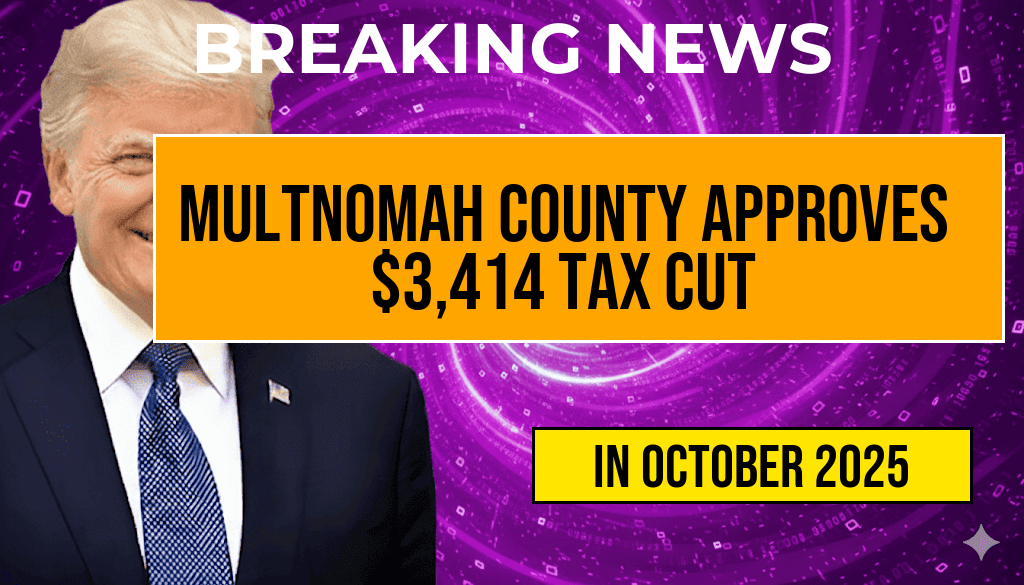Multnomah County has approved a significant tax reduction amounting to $3,414 per household under recently enacted legislation aimed at easing financial burdens on residents. The measure, passed unanimously by the county board of commissioners, reflects a strategic effort to stimulate economic activity while addressing concerns about rising living costs. The legislation, introduced earlier this year, reallocates funds from existing budgets and surplus reserves to provide direct relief to homeowners and renters alike. Officials project that this tax reduction will benefit approximately 400,000 households across the county, potentially saving residents millions annually. The decision aligns with broader efforts across Oregon to balance fiscal responsibility with social support amid ongoing economic challenges.
Details of the Tax Reduction Legislation
Scope and Implementation
The legislation, officially titled the Multnomah County Tax Relief Act of 2024, was drafted to provide immediate financial relief by reducing property tax bills. It targets both residential property owners and renters, with specific provisions designed to ease the tax burden on lower- and middle-income households. The measure reallocates surplus funds from the county’s budget, including unspent allocations from previous fiscal years, to support the reduction.
Implementation will occur over the next fiscal year, with affected residents seeing the impact reflected on their upcoming tax statements. County officials have assured the public that the reduction will be automatic, requiring no action from individual taxpayers to receive the benefit. The legislation also includes provisions for auditing and transparency to ensure funds are appropriately allocated.
Financial Impact and Budgetary Considerations
| Households Benefited | Total Reduction per Household | Total County Savings |
|---|---|---|
| Approximately 400,000 | $3,414 | $1.36 billion |
County officials estimate that the total reduction will amount to roughly $1.36 billion across all households benefiting from the measure. This substantial fiscal adjustment is expected to be funded primarily through surplus reserves, avoiding the need for increased taxes or borrowing. The move has garnered praise from community advocates, who see it as a proactive step toward economic justice, while some fiscal conservatives caution about the long-term implications for county revenues.
Community and Political Reactions
Support from Community Leaders
Local advocacy groups and community leaders have largely welcomed the legislation, emphasizing its potential to provide tangible relief during a period of rising inflation and housing costs. Economic insecurity has been a growing concern among residents, and officials argue that this measure helps mitigate some of those pressures.
“This is a decisive move to support our residents who are feeling the squeeze from economic pressures,” said Maria Lopez, director of the Multnomah Community Action Network. “Reducing property taxes by this magnitude can make a real difference in people’s daily lives.”
Critics and Fiscal Concerns
However, some critics have voiced reservations about the long-term fiscal stability of the county. A few county commissioners expressed concerns that diverting surplus funds might impact future investments in infrastructure or public services. “While relief is necessary, we must ensure that our fiscal policies remain sustainable,” noted Commissioner John Smith. “There’s a risk that such a large reduction could limit our ability to respond to unforeseen budget needs.”
County officials have assured the public that comprehensive financial planning will accompany the implementation to mitigate potential risks. Additionally, they emphasized that the surplus funds are sufficient to cover the reduction without compromising essential services.
Broader Context and Future Implications
Comparison with State and National Trends
Multnomah County’s decision aligns with a broader national trend of local governments adopting targeted tax relief measures to combat economic hardship. Similar initiatives have been implemented in various jurisdictions, often focusing on property taxes or sales taxes, to foster economic resilience.
At the state level, Oregon has seen discussions about tax reform, particularly concerning property taxes, with some advocates pushing for more comprehensive relief. The county’s approach may serve as a model for other jurisdictions seeking to balance fiscal responsibility with social support.
Potential for Future Legislation
The success of this tax reduction could influence future policies, encouraging more proactive fiscal measures during economic downturns. Officials are already considering additional programs aimed at supporting affordable housing and reducing homelessness, which remain persistent issues in Multnomah County.
As residents begin to experience the benefits of this legislation, stakeholders will be watching closely to assess its impact on community well-being and county finances. The legislation marks a notable shift toward more responsive local governance aimed at addressing residents’ immediate needs.
Frequently Asked Questions
What is the total amount of tax reduction approved by Multnomah County?
The Multnomah County Board has approved a $3,414 tax reduction under the new legislation.
Who is eligible for the tax reduction approved by Multnomah County?
Eligibility details are typically determined by the new legislation, which may include specific criteria such as income levels or property types. Residents should consult the official county resources for precise eligibility requirements.
When will the tax reduction take effect for residents?
The tax reduction is expected to be applied in the upcoming tax cycle, with specific dates to be announced by Multnomah County officials.
How will this legislation impact local residents financially?
The $3,414 tax reduction will decrease the financial burden on qualified residents, potentially resulting in significant savings on their property taxes or other applicable taxes.
What prompted Multnomah County to approve this tax reduction?
The legislation was approved in response to economic considerations or community needs, aiming to provide relief and support to residents during challenging times.






